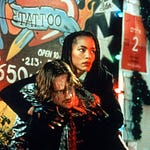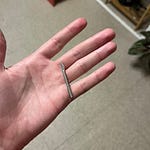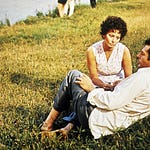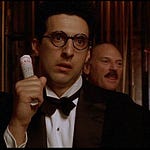I used to work as a copywriter at a third-wave coffee company. Before I was hired, I drank Starbucks, or whatever came out of the spattered pot on someone’s kitchen counter, its bitterness concealed with creamer and refined sugar. But since everything I wrote was to be printed on packages, cans, and display cases, becoming a coffee snob was a part of the job description.
I spent a lot of time at the roastery with real coffee people—roasters, farmers, buyers, baristas—getting to know the product. Dirtying countless cupping spoons, I sipped, slurped, and huffed freshly brewed varietals from Guatemala to Myanmar. Like wine, cheese, or chocolate tasting, coffee cupping requires thinking with your mouth, nose, and tongue. You use these instruments to assess the sweetness, acidity, body, and finish of not just every cup, but every sip, of the strange tea that a billion people drink each morning.
That copywriting job, which I got in my late twenties, was my first exposure to the idea of flavor as a multidimensional experience. Growing up, no one in my family approached any sensation with that much thought or intention. My parents drank sugary margaritas, discount wine, and Budweiser. Dark chocolate didn’t exist. Cheese came in sticks or oblongs wrapped in plastic. Food in general was only of interest as a risk factor in becoming fat, not that the alternative was much better; in my families, like many other white American homes, you either became fat and hated, or remained thin and resented.
This terror of fatness informed the way we ate in confusing, contradictory ways, which varied depending on which parent my sisters and I were living with. With my single working mom, food needed to be convenient and cheap, so dinner was often picked up at a drive-thru. Though my dad had a wife to shift the reproductive labor onto (though she, like he, worked full time), there was less money but an additional kid to feed: fast food wasn’t cheap enough. Since I was often in charge of my sisters, I boiled pallets of Top Ramen and gallons of Kraft’s mac n cheese, the latter occasionally bobbing with chunks of brutalized hot dog. Then there were my stepmom’s cheap diet foods—in my teens, America was cresting the anti-fatness tsunami that’s since collapsed into the insidious “wellness” rebrand—with their carcinogenic sweetness, cardboard texture, and chemical aftertaste.
Eating what you fear is not merely unpleasant. It prevents you from asking yourself if you are enjoying your food, what people and places and meals it reminds you of, what you would change about the recipe if you were to prepare it again. It prevents you from admiring what your food looks like or how it’s been plated, or inhaling its scent before it goes in your mouth, or chewing enough for comfortable digestion, or savoring a dish that is excellent or novel or, as we say in English, made with love. Fearing your food extricates you from the moment while obliterating your connection to past or future. More than being unpleasant, fearing your food is bad for you—mind, body, and soul.
At the roastery, phone and notebook ready for note-taking, I often felt very stupid. Many of my coworkers who were learning alongside me had professional backgrounds in food or hospitality, so even if they were as new to coffee cupping as I was, they had a foundation to build on that I didn’t. Everyone else seemed to be able to identify the notes of stone fruit or fresh-cut grass or baker’s chocolate that eluded my atrophied senses. Sometimes I was convinced that they were lying, that they were just pretending to agree with any coffee’s given profile. Elbow out as I lowered my face to my spoon, I imagined the shape of my tongue and the liquid around it, trying to inhale and think and perceive without dribbling down my front when I spat into the mug reserved for waste. Though intriguing, the idea that a single spoonful of a single roast of a single varietal from a single season harvested on a single patch of land could express a rainbow of flavor, holoscoping as it cooled, was alien and frustrating. Scribbling my notes, I prayed that no one else noticed how clueless I was.
I had that job for a few years, long enough to learn a little, enough that I can now appreciate coffee in a way I didn’t before. Being addicted to this bittersweet, palm-warming drink is its own simple joy; discovering through it that sensation is not off or on, this or that, was the beginning of a paradigm shift. Flavor, which I had once experienced as a numbing agent, at best, revealed its depths. Like pleasure and pain, flavor is biomedical reality, social construct, cultural memory, and the substance of our days—the composite of living.
Flavor is interpretation, divination, introspection. I’m reminded of Alex Chee’s writing on writing in his book, How to Write an Autobiographical Novel:
To write is to sell a ticket to escape, not from the truth but into it. My job is to make something happen in a space barely larger than the span of your hand, behind your eyes, distilled out of all that I have carried, from friends, teachers, people met on planes, people I have seen only in my mind, all my mother and father ever did, every favorite book, until it meets and distills from you, the reader, something out of the everything it finds in you. All of this meets along the edge of a sentence like this one, as if the sentence is a fence, with you on one side and me on the other… Something new is made from my memories and yours as you read this. It is not my memory, not yours, and it is born and walks the bridges and roads of your mind, as long as it can.
David tweets at @k8bushofficial. Preorder their second novel, X (Catapult, 2022).
Subscribe to support GOOD ADVICE/BAD GAY, an advice series from an anonymous gay therapist who’s not afraid to hurt your feelings with the truth. (Sample an unlocked post for a taste of what you’re missing.) 100% of funds go to support a rotating selection of mutual aid and reparations projects.
Want advice? Email badgayadvice@gmail.com for a free 3-month subscription.












